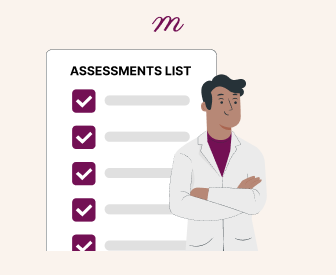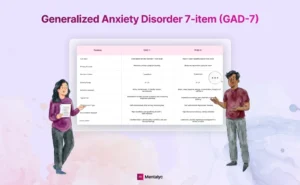Curious about how occupational therapists assess and treat mental health conditions? Assessments play a crucial role in occupational therapy, guiding personalized interventions for individuals. With various assessments available, occupational therapists can identify specific areas of need and create treatment plans accordingly. In this enlightening article, learn about occupational therapy mental health assessments’ purpose, benefits, and limitations. Whether you’re a mental health professional or a student, this valuable information will deepen your understanding of this essential aspect of the OT process!
The Significance of Occupational Therapy Assessments for Mental Health
Understanding the importance of mental health assessments in occupational therapy is important for evaluating a client’s ability to engage in daily activities affected by their mental health condition. Occupational therapists use various assessments to understand how clients’ symptoms and behaviors impact their performance in self-care, work, and leisure activities. These assessments help identify the client’s strengths and areas of difficulty across physical, cognitive, emotional, and social domains. By understanding your client’s needs, priorities, and goals, therapists can create individualized treatment plans to improve their ability to participate in meaningful occupations. Through assessments, occupational therapists can gain insights into how a client’s mental health affects motivation, interest in activities, energy levels, concentration, memory, self-esteem, coping skills, stress management, and social participation.
These assessments also provide a baseline for measuring the effectiveness of therapy interventions and tracking the client’s progress over time. The information gathered from these assessments influences diagnosis, treatment planning, and overall outcomes. Many assessments are designed to be user-friendly for clients to self-administer, making them more accessible. When used correctly, these assessments are invaluable tools for gaining insight, guiding treatment, and ensuring the best outcomes for clients. Ultimately, they help advance the mental health field by enabling more targeted and effective interventions.
Discovering the Benefits of Occupational Therapy Assessments
These assessments offer valuable insights and provide several advantages to therapists and other professionals, such as:
Enhanced Communication and Understanding
Assessments can enhance communication between the occupational therapist and the client by offering objective data that the client can comprehend. This facilitates open discussions about their symptoms and requirements. This improved understanding and communication result in stronger therapeutic relationships and more effective treatment.
Improved Collaboration with Other Healthcare Providers
The objective data from assessments provides valuable information that occupational therapists can share with other professionals on a client’s care team, including psychologists, psychiatrists, and social workers. This enhances care coordination and ensures all providers are aligned regarding the client’s condition and needs.
Providing a Baseline for Measuring Client Progress
Consistent assessments are crucial for therapists to measure client progress and evaluate the effectiveness of interventions. The data collected provides objective metrics to demonstrate improvement and make necessary adjustments to the treatment plan. Re-administering these assessments periodically allows therapists to objectively measure improvements in scores and symptoms, helping determine whether treatments should be continued or adjusted.
Identifying Cognitive Issues
Assessments help identify cognitive issues that impact mental health, such as problems with memory, attention, processing speed, and executive functioning. This insight allows occupational therapists to create cognitive interventions that target specific deficits and improve daily living skills.
Identifying Co-occurring Conditions
Many mental health assessments screen for more than one condition, which helps in identifying co-occurring disorders. This can lead to tailored treatment plans that address all relevant disorders upfront, resulting in a more holistic and comprehensive approach.
Factors to Consider When Using Occupational Therapy Assessments for Mental Health
When utilizing occupational therapy assessments for mental health, it’s essential to acknowledge their role in providing valuable objective data to inform treatment plans. However, it’s equally important to remain mindful of their limitations, particularly about potential gaps in self-awareness or insight, and address any potential limitations they may present.
Reliability and Validity
It’s essential to look for assessments with solid evidence supporting their reliability and validity to ensure consistent and accurate results across different administrators. Seek out assessments with robust testing to support their use.
Cultural Bias
Many assessments are standardized on predominantly white populations, which limits their applicability to diverse groups. While some assessments have alternate forms for different cultures, more inclusive approaches are still needed. It’s essential to be aware of the populations on which assessments were normed and recognize that cultural and language barriers can impact the validity and reliability of evaluations.
Time Requirements
When selecting assessments, it’s vital to consider the time required for administration, scoring, and interpretation. This can be demanding for both the practitioner and the client, so choosing assessments feasible for your practice setting and the time you have available is essential.
Cost
Cost is a factor to consider. While some assessments are free, others require purchasing manuals, forms, and licenses, which may only be affordable for some practitioners. We suggest looking for affordable or accessible options whenever possible.
Comprehensive List of Common Occupational Therapy Assessments for Mental Health
The list below outlines commonly used occupational therapy assessments for mental health, along with fundamental details to keep in mind:
Barratt Impulsiveness Scale (BIS)
The BIS is widely used in research and clinical settings to assess impulsive behavior and personality traits in adults aged 18 and above. This assessment involves a 30-question self-assessment survey where individuals rate how frequently each statement applies to them using a 4-point Likert scale. Typically, it takes around 15 minutes to complete.
Beck Anxiety Inventory (BAI)
The BAI is a 21-item self-report inventory designed to gauge an individual’s level of anxiety. Respondents use a 4-point Likert scale to indicate the extent to which they have experienced each stress-related symptom over the past week. Suitable for individuals aged 17 and above, the BAI takes approximately 10 minutes to complete.
Beck Depression Inventory (BDI)
The BDI is a 21-item multiple-choice self-report inventory used to measure the severity of depression based on the DSM-V diagnostic criteria, indicated by a 4-point Likert scale. This tool is suitable for individuals aged 13 and older and takes 10 minutes to complete.
Beck Hopelessness Scale (BHS)
The BHS consists of 20 items and can be completed in 5 to 10 minutes. It’s designed to measure negative attitudes toward the future using a true/false scale, exploring emotions about the future, lack of motivation, and expectations. It’s suitable for individuals aged 17 and above.
Brief Sensation Seeking Scale (BSSS)
With just eight items, the BSSS self-assessment tool gauges an individual’s inclination toward novel, varied, complex, and intense sensations and experiences through a 5-point Likert scale. It typically takes 2-3 minutes to complete and is suitable for individuals aged 14 and above.
Depression, Anxiety, Stress Scale (DASS-42)
the DASS-42 is a widely used 42-item self-report assessment that measures the severity of symptoms associated with depression, anxiety, and stress. Participants rate the severity and frequency of each symptom over the past week on a 4-point Likert scale, and it takes around 10 minutes to complete. This tool is suitable for individuals aged 12 and older.
General Self-Efficacy Scale (GSES)
The GSES is designed to gauge an individual’s overall perceived self-efficacy and belief in their ability to handle challenging or stressful situations. It includes a 10-item questionnaire and a 5-point Likert scale to indicate the extent to which each statement is true. This assessment is suitable for individuals aged 12 and above and typically takes 5 minutes.
Generalized Anxiety Disorder 7-item (GAD-7)
The GAD-7 is a self-reported questionnaire used to screen for and assess the severity of generalized anxiety disorder (GAD). It comprises seven items with a 4-point Likert scale. Two versions are available: one for individuals aged 11-17 and another for those aged 18 and above. It usually takes about five minutes to complete.
Geriatric Depression Scale (GDS)
The GDS is a widely utilized self-assessment tool that is available in short and long forms. It is commonly used in various settings, including community outreach and acute and long-term care, to identify depression in individuals aged 60 and above. The short-form GDS, or GDS-15, consists of 15 questions, while the long-form, GDS-30, comprises 30 questions and typically takes 10 minutes to complete. Respondents provide answers using a yes/no scale.
Patient Health Questionnaire (PHQ-9)
The PHQ-9 is a valuable tool consisting of nine self-report items that help screen for and assess the severity of depression. Each item scores the nine DSM-V depression criteria on a 4-point Likert scale. Widely used in primary care and mental health settings, the PHQ-9 can be completed by individuals as young as 12 and typically takes only 5 minutes. It offers the flexibility to be self-administered or administered by a clinician.
Penn State Worry Questionnaire (PSWQ)and thePenn State Worry Questionnaire for Children (PSWQ-C)
The PSWQ and PSWQ-C are valuable self-report measures designed to assess worry levels in different age groups. The PSWQ is a 16-item questionnaire for adults, while the PSWQ-C is a 14-item questionnaire for children and adolescents. Both questionnaires provide insightful data and are relatively quick to complete, taking most clients around 10 minutes.
Reflective Functioning Questionnaire (RFQ)
The RFQ is an 8-item self-report tool designed to assess an individual’s mental capacity to understand others’ perspectives. Respondents use a 7-point Likert scale, and the questionnaire typically takes around 5 minutes to complete. There are specialized versions of the RFQ for youth RFQ-Y and the PRFQ for parents of young children. It’s important to note that while the RFQ is being used, ongoing research discussions are focused on its validity, particularly regarding item content, scoring procedure, dimensionality, and associations with psychopathology. If you consider using this tool, conducting thorough research and developing informed thoughts about its application are essential.
Rosenberg Self-Esteem Scale (RSES)
The RSES is a 10-item self-assessment tool utilizing a 4-point Likert scale, commonly used in clinical and research settings. It is suitable for different age groups, starting from 12 years old, and typically takes around 5 minutes to complete.
Social Functioning Questionnaire (SFQ)
The SFQ consists of 25 self-report items aimed at assessing the social functioning of individuals dealing with mental illnesses. It uses a 5-point scale to evaluate social engagement/withdrawal, interpersonal communication, independence-competence, and participation across four domains. This assessment typically takes around 20 minutes to complete and is commonly utilized with adults aged 18 and above.
The Kessler Psychological Distress Scale (K10)
The K10 is a valuable tool used in Australia to assess anxiety and depression levels in adolescents under 18. It consists of 10 questions that prompt individuals to report the frequency of experiencing various symptoms of psychological distress over the past 30 days. The K10 scale takes about 5 minutes to complete.
World Health Organization Well-Being Index (WHO-5)
The WHO-5 is a 5-item self-report measure rated on a 6-point Likert scale designed to evaluate positive well-being in adults, adolescents, and children aged nine and above across five domains: self-acceptance, personal growth, purpose in life, positive relations with others, and environmental mastery. It takes about 5 minutes to complete.
You can save time documenting assessments with Mentalyc’s structured templates, which streamline your workflow while ensuring thorough and organized records. Consider exploring how Mentalyc can support accurate, comprehensive note-taking for occupational therapy in mental health.
Conclusion
Understanding occupational therapy assessments for mental health is essential for therapists, counselors, and students. These assessments help us evaluate clients and track their progress. While no assessment is perfect, they give us a more complete understanding of our clients and their experiences. It’s crucial to keep learning about new and existing assessment tools. As occupational therapists, we must ensure that we offer our clients the highest quality of care by utilizing suitable, culturally sensitive, and practical assessments. We must approach assessments as a tool for gaining valuable insight rather than as the ultimate objective for increasing our clients’ success rates.
Join our mailing list to stay updated on the latest mental health practices, diagnoses, and business tips for private practices. Also, simplify your progress note process with Mentalyc. Our HIPAA-certified AI notes appcreates progress notes automatically, saving you time and allowing you to focus on your clients. Sign up for your trial today!
FAQs: Your Top Questions About Occupational Therapy Assessments for Mental Health Answered
What exactly are occupational therapy assessments for mental health?
Understanding the purpose of occupational therapy assessments for mental health is essential. These assessments are valuable tools for evaluating a client’s mental health and daily functioning. They enable occupational therapists to identify client strengths, challenges, and goals, which in turn helps tailor effective treatment plans. These assessments commonly include questionnaires, checklists, scales, and interviews.
Why are occupational therapy assessments critical?
Recognizing the significance of occupational therapy assessments is pivotal. They provide objective data to inform treatment planning and track progress. By comprehensively assessing a client’s condition and needs, therapists are better equipped to deliver personalized care. Additionally, the results offer clients valuable insights into their mental health and facilitate establishing collaborative goals. Ultimately, these assessments are crucial for providing practical, evidence-based care.
Who can administer these assessments?
Occupational therapists and occupational therapy assistants are the experts in administering and interpreting occupational therapy assessments. While other mental health professionals may use some assessments, occupational therapists have specialized education in how these tools relate to daily functioning and occupational performance.
What are some well-known occupational therapy assessments for mental health?
Some of the most commonly used assessments include:
- Generalized Anxiety Disorder 7-item (GAD-7) scale
- Geriatric Depression Scale (GDS)
- Rosenberg Self-Esteem Scale (RSES)
- Patient Health Questionnaire (PHQ-9)
What are the benefits and limitations of administering these assessments to our clients?
Administering assessments to our clients offers numerous benefits, including providing objective data to guide treatment and measure progress. However, it’s essential to acknowledge that there are limitations to consider. These assessments can be time-consuming, and external factors may impact the results. Additionally, some assessments may not fully capture a client’s experience. Recognizing that mood, memory issues, or comprehension difficulties can influence self-report measures is crucial. Therefore, it’s essential not to rely solely on these assessments for diagnosis but to use them to supplement a comprehensive evaluation. Therapists must exercise their clinical judgment when interpreting the results. Despite these limitations, when used properly by a skilled therapist, the benefits far outweigh the potential downsides. These assessments transform mental health care into an evidence-based, collaborative process that improves daily life and overall well-being.
Resources:
- Rodgers, J., & Holm, M. (2016, June).Functional Assessment in Mental Health: Lessons From Occupational Therapy. PubMed Central. https://www.ncbi.nlm.nih.gov/pmc/articles/PMC4969701/
- Ferri, B. (n.d.).The Ultimate Guide to Mental Health and OT. Travel Nursing Jobs & Medical Staffing. https://www.coremedicalgroup.com/blog/mental-health-and-occupational-therapy
- London City Healthcare. (n.d.).Mental Health Occupational Therapy. https://londoncityhealthcare.com/occupational-health-services/mental-health-occupational-therapy/
- Morgan Medical Center. (2023, September 28).Benefits of Occupational Therapy for Mental Health. https://morganmedical.org/blog/benefits-of-occupational-therapy-for-mental-health/
- OT Works!. (2024, February 9).What to expect of an Occupational Therapy Assessment. https://www.ot-works.com/2024/02/what-to-expect-of-an-occupational-therapy-assessment/
Why other mental health professionals love Mentalyc

“It helps align the note and the plan for moving forward with sessions … it’s been a really good aid in giving me direction.”
LPC

“I go back and can read the notes, and it really helps me for the next session. It has made me a much better counselor.”
Licensed Professional Counselor

“It improves the quality of my work as I review my sessions … I bring a sense of continuity from session to session because of the really good summary and progress notes that Mentalyc gives me.”
Licensed Marriage and Family Therapist

“I benefit tremendously every time I wrap up a session and then a few minutes later, I have this AI note. It makes me a better clinician in a variety of ways.”
LPC





